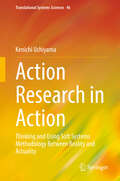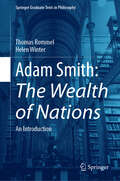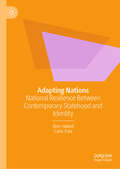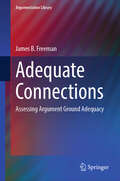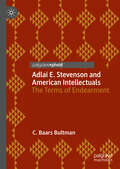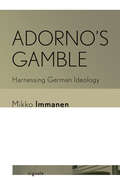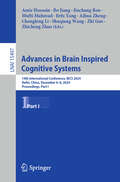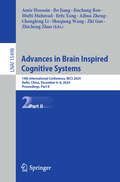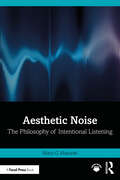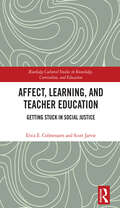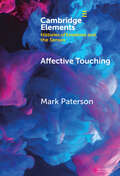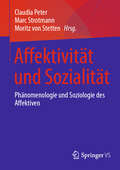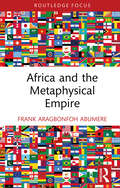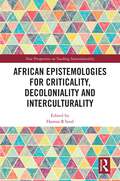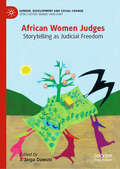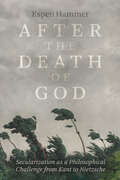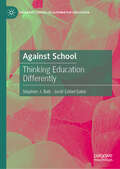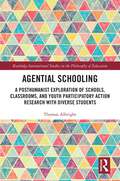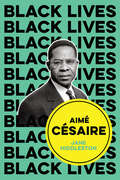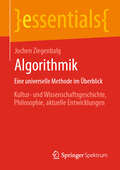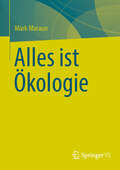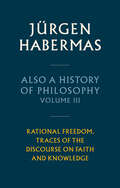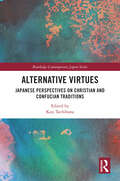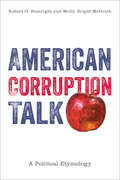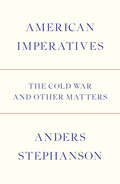- Table View
- List View
Action Research in Action: Thinking and Using Soft Systems Methodology Between Reality and Actuality (Translational Systems Sciences #46)
by Kenichi UchiyamaThis is the first book to provide the fundamental backbone for the field of action research (AR). One of the main characteristics of AR is to achieve a kind of learning based on experience through action in the real world, connecting and reconciling theory and practice by reflection for / in / by action. A standard form of AR has not yet been found, however, because it is difficult for conventional academicians to effectively bridge the gap between objectivity in theory and subjectivity in practice. For the past 50 years, soft systems methodology (SSM) has developed the methodology to deal with subjectivity by rigorously adhering to a coherent guideline of a systemic means for discussion— for example, accommodation (i.e., living with different individual worldviews). The author began to reinterpret SSM from an Eastern context at Lancaster University (UK), and received a Ph.D. at the London School of Economics, introducing the &“actuality&” point of view. This idea originated with the eminent Japanese psychiatrist Bin Kimura, who argued that schizophrenics do not lose touch with reality but with actuality. That is, there are two aspects of the world, reality and actuality, based on Latin res (&“thing&”) and actio (&“action&”). They can recognize all things of the world as &“reality&” as expressed by that noun but cannot comprehend with a feeling of reality the predicate &“actuality&”. Introducing actuality into SSM as a new dimension opened a new perspective in SSM both theoretically and practically. This topic is discussed in detail in Part II of this book. Part I contains three chapters. Chapter 1 provides a basic conceptual overview of SSM. Chapter 2 provides an actual trace of the evolution of SSM over the last 25 years. One topic that is expected to become the subject of serious practical application of SSM in the future is its application to resilience. This is discussed in some detail in Chapter 3. The actuality aspect of SSM has been used for more than 20 years in various contexts, yielding many good results. Among those are a new explanation of accommodation using paleo logic or predicate logic; a new management cycle based on actuality, such as learning for / in / by action; and the novelty of the methodological tool itself. Those 20 years of learning authenticate the guideline for the way of discussion or agreement that is relevant to actuality. Especially in the recent Covid-19 pandemic, it has oriented the restoration of actuality in the digital-based society, where actuality is deadened. This result is also dealt with in Part I.
Adam Smith: An Introduction (Springer Graduate Texts in Philosophy)
by Helen Winter Thomas RommelThis textbook provides an accessible introduction to Adam Smith, one of the most important economic thinkers. His seminal work The Wealth of Nations is a classic text in philosophy, social sciences and economics. This introduction puts Smith&’s central ideas on the division of labour, the invisible hand and the market into context. A careful analysis of key passages from Smith&’s writings explains how he arrived at a theory of society and the market that has become central to our understanding of human motives. The discussion of Smith&’s The Wealth of Nations is followed by sources from the 18th century that shaped Smith&’s analysis of human motives and propensities. This introduction is indispensable reading for an informed discussion of the mechanisms that govern human society. It provides an introduction to Adam Smith as one of the most astute thinkers of the 18th century, whose ideas shape modern concepts of the market, making it ideal as course material in courses such as economics, history, political sciences, sociology, literary studies, philosophy.
Adapting Nations: National Resilience Between Contemporary Statehood and Identity
by Carlo Pala Alon HelledNations adapt. Nations are resilient both within and outside the boundaries of statehood. Yet scholarship tends to downplay nationhood, as it focuses on the polity. As a consequence, the investigation of modern societies, though usually articulated around the nation-state model, falls into state-centrism, whilst neglecting the other side of the coin. This book initiates an interdisciplinary debate that encourages research in a field that has largely been overlooked in European social and political sciences. The analysis, offered by the authors, reinstates the concept of the 'nation' beyond the traditional, and somewhat dichotomous, schools of thought, hence neither judging the nation as a mere invention nor as a deterministic product of history. The book provides those interested in nationalism with new approaches to exploring national identity and its connection to statehood. By using concepts inspired by political science and sociology, namely habitus, survival unit, polity, hysteresis, and so forth, the different chapters of the volume revitalise the inquiry of the dimensions and features in which the nation and the identification they engender become tools of adaptation in relation to the transformative reality of our own contemporaneity. The authors thus contextualise the latter via the mid-range concept of national resilience at both meso- and macro-levels.
Adequate Connections: Assessing Argument Ground Adequacy (Argumentation Library #38)
by James B. FreemanThis book presents a comprehensive picture of when the premises of an argument are adequately connected to its conclusion. The author draws upon the familiar Toulmin model, Rescher’s discussion of presumption and burden of proof, and L. Jonathan Cohen’s presentation of the method of relevant variables. The book first assesses the warrant or inference rule connecting the premises to the conclusion. To analyzes this, the author asks a series of questions such as - should the warrant be evaluated by conclusive or defeasible standards? Does the argument require that its premises, if acceptable, guarantee that the conclusion is acceptable also or does it allow the premises just to present a body of relevant evidence? Is the inference rule backed or supported a priori or a posteriori? These distinctions form four categories of warrants: conclusive a priori, defeasible a posteriori, defeasible a priori, and virtually conclusive a posteriori. The warrants in each category are evaluated differently for how strongly the premises support the conclusion of arguments instancing those warrants. After presenting the rationale for this division and discussing our nonprobabilistic approach, the author analyzes the connection adequacy for each of these types of warrants. This book is of interest to scholars of argumentation theory.
Adlai E. Stevenson and American Intellectuals: The Terms of Endearment
by C. Baars BultmanThis book focuses on a biographical and cultural rendering of Adlai E. Stevenson's alliance with a segment of the intellectual community, with primary attention to the years from 1940 to his death in 1965. At the core of the study is an evaluation of the nature of a relationship that was important both to intellectuals, particularly literary intellectuals, and to Stevenson. This volume exhibits case studies which illumine the alliance through a view of Stevenson's relations with American writers Archibald MacLeish and John Steinbeck.
Adorno's Gamble: Harnessing German Ideology (Signale: Modern German Letters, Cultures, and Thought)
by Mikko ImmanenAdorno's Gamble offers a startling reinterpretation of the evolution of Theodor W. Adorno's thought, usually seen as a mix of critical Marxism, Freudian psychoanalysis, aesthetic modernism, and Jewish tradition. Mikko Immanen argues for another, previously unacknowledged source of Adorno's thinking on instrumental reason, dialectic of enlightenment, and frailty of democracy: the intellectual underpinnings of Germany's "conservative revolutionary" movement of the 1920s.In a dramatic reappraisal of the leading light of the Frankfurt School, Immanen follows Adorno's path of philosophical development from the late Weimar era through years in exile to the postwar period, establishing his debt to thinkers of radical conservative bent. In particular, he focuses on Adorno's enduring, and daring, effort to harness two of the most infamous works from this tradition—Oswald Spengler's Decline of the West and Ludwig Klages's The Spirit as Adversary of the Soul—and to repurpose their reactionary teachings for emancipatory ends.
Advances in Brain Inspired Cognitive Systems: 14th International Conference, BICS 2024, Hefei, China, December 6–8, 2024, Proceedings, Part I (Lecture Notes in Computer Science #15497)
by Amir Hussain Bo Jiang Jinchang Ren Chenglong Li Mufti Mahmud Erfu Yang Aihua Zheng Shuqiang Wang Zhi Gao Zhicheng ZhaoThe two-volume set LNAI 15497 and LNAI 15498 constitutes the refereed proceedings of the 14th International Conference on Brain Inspired Cognitive Systems, BICS 2024, held in Hefei, China, during December 6–8, 2024. The 56 full papers presented in these two volumes were carefully reviewed and selected from 124 submissions. These papers deal with various aspects of brain inspired cognitive systems, focusing on latest advancements in brain-inspired computing; artificial intelligence; and cognitive systems.
Advances in Brain Inspired Cognitive Systems: 14th International Conference, BICS 2024, Hefei, China, December 6–8, 2024, Proceedings, Part II (Lecture Notes in Computer Science #15498)
by Amir Hussain Bo Jiang Jinchang Ren Chenglong Li Mufti Mahmud Erfu Yang Aihua Zheng Shuqiang Wang Zhi Gao Zhicheng ZhaoThe two-volume set LNAI 15497 and LNAI 15498 constitutes the refereed proceedings of the 14th International Conference on Brain Inspired Cognitive Systems, BICS 2024, held in Hefei, China, during December 6–8, 2024. The 56 full papers presented in these two volumes were carefully reviewed and selected from 124 submissions. These papers deal with various aspects of brain inspired cognitive systems, focusing on latest advancements in brain-inspired computing; artificial intelligence; and cognitive systems.
Aesthetic Noise: The Philosophy of Intentional Listening
by Mary G. MazurekAesthetic Noise: The Philosophy of Intentional Listening considers the complex nature of noise within the framework of philosophical filtering, examining how, if noise is engaged with aesthetically, it can produce profound experiences and understandings.Applying the philosophies of Edmund Burke, Martin Heidegger, Jacque Derrida, and Julia Kristeva to works by Luigi Russolo, John Cage, Steve Reich, Alison Knowles, Annea Lockwood, Alyce Santoro, and Sunn O))), this book explores noise as an art material, and ultimately how it can become a tool for activism and expanded creative possibilities. It demonstrates that, by engaging multiple philosophies in concert, the value of aesthetic noise is amplified, thus allowing the listener to better appreciate noise and its possibilities.Providing greater insights into noise as an aesthetic material, Aesthetic Noise will be of interest to researchers and students of sound studies, philosophy, and sound art, as well as sound designers, artists, musicians, and composers.
Affect, Learning, and Teacher Education: Getting Stuck in Social Justice (Routledge Cultural Studies in Knowledge, Curriculum, and Education)
by Erica E. Colmenares Scott JarvieThis volume inquires into student teachers’ “stuck moments”—moments of felt crisis—as they occur within the context of a university-based social justice teacher education (SJTE) program. The book complicates the notion that these stuck moments are primarily effects of a gap between theory and practice. Instead, Colmenares and Jarvie argue for a more robust conceptualization, drawing on affect theory, posthumanism, and Deleuzian scholarship. By considering what stuck moments do, and do to, student teachers, the book reimagines SJTE in ways that are both responsive to stuckness and disruptive of discourses of learning that dominate the field. Through a critique of the affective workings of learning, the authors consider how these discourses can prove counterproductive for the work of teaching for social justice. This insightful and stimulating volume will be of use to scholars, researchers, and students with interests in curriculum studies, affective approaches to education and SJTE.
Affective Touching: Neurobiology and Technological Applications (Elements in Histories of Emotions and the Senses)
by Mark PatersonAt the end of the twentieth century the discovery of 'slow', affective touch nerves in humans known as C Tactile (CT) afferents, which are entirely separate from the faster pathways for touching objects, had huge social implications. The Swedish neuroscientists responsible formulated an “affective touch hypothesis” or “social touch hypothesis” to consider their purpose. Part I offers a history of the science of social touch, from related discoveries in mammals by physiologists in the 1930s, to the recent rediscoveries of the CT nerves in humans. Part II considers how these findings are being intentionally folded into technologies for interaction. First, as mediated social touch, communicating at a distance through haptics. Second, with the increasing number of social and service robots in health care and domestic settings, the role of affective touch within human-robot interaction design.
Affektivität und Sozialität: Phänomenologie und Soziologie des Affektiven
by Claudia Peter Marc Strotmann Moritz Von StettenAffekte bestimmen unser soziales Zusammenleben. In Form von Empfindungen, Stimmungen und Sensibilitäten sind sie Ausdruck unserer Berührbarkeit und Empfänglichkeit, sie schärfen unsere Aufmerksamkeit, lenken unsere Wahrnehmung oder treffen uns in unserer Verletzlichkeit. Über sie und mit ihnen erschließen wir uns selbst, andere und die Welt. Die affektiven Dimensionen des Sozialen sind infolge des affective turn Gegenstand neuerer interdisziplinärer Forschung. Anliegen des Buches ist es, das Potential der Phänomenologie innerhalb der Affektforschung anhand theoretischer und empirischer Fallstudien aufzuzeigen. Der Band versammelt Beiträge aus der Philosophie und Soziologie, die unter anderem an phänomenologische Ansätze von Husserl, Scheler, Merleau-Ponty, Patočka, Levinas, Waldenfels, Schmitz und Ratcliffe anknüpfen. Damit ermutigen die Texte des Bandes zu einem verstärkten Dialog zwischen philosophischer Reflexion und empirischer Sozialforschung.
Africa and the Metaphysical Empire (Routledge Studies in African Philosophy)
by Frank Aragbonfoh AbumereThis book investigates whether African cultures can appropriate some useful aspects of Western cultures, or whether doing so risks falling into the metaphysical empire and diluting African identity.Ngugi wa Thiong’o and Ndlovu-Gatsheni characterise the metaphysical empire as an intangible non-physical and non-geographical invasion of the mental universe of formerly colonised peoples. As mutual exclusivists, they argue that authentic decolonization necessitates a complete dissociation of the African and her culture from colonial heritage. However, cultural appropriationists such as Wole Soyinka, Chinua Achebe and Chimamanda Ngozi Adichie argue that the African adoption of colonial heritage such as the English language is in no way antithetical to decolonization. This book delves into the debate by exploring the strengths and weaknesses of cultural appropriationism and, on the other hand, testing the validity of mutual exclusivism. The book demonstrates that cultural appropriation without falling into the metaphysical empire is possible, but that this poses important questions about the nature of the decolonization project itself, and where it should start and stop. A more accommodative decolonization would recognize the relationship between cultural universals and particulars, whilst also creating room for cultural appropriation. Ultimately, the book argues that both cultural appropriationists and mutual exclusivists must simultaneously renounce absolutism. By being amenable to a fusion of horizons, discourse can move beyond the decolonization fallacy of arguing that things are always either/or.This original and important contribution to the metaphysical empire debate will be a seminal read for researchers across the fields of philosophy, political science, African studies, and Black studies.
African Epistemologies for Criticality, Decoloniality and Interculturality (New Perspectives on Teaching Interculturality)
by Hamza R'BoulThis book addresses the underrepresentation and, more importantly, the misrepresentation of African epistemologies and traditions of thought in making sense of, theorizing, and doing interculturality.Africa remains (probably) the most oppressed and silenced sphere throughout centuries of colonialism and contemporary coloniality. Therefore, such an anthology provides a platform for those insights that have substantial epistemic capacity to alter our taken‑for‑granted notions of what interculturality is and what it is about. While a number of works have charted the contributions of African epistemologies in advancing our understanding of our intercultural realities, this book argues that the processes of decoloniality through and within interculturality have never been about (under) (mis)representation per se, but about how the politics of representation can provide inaccurate, tokenistic, and false inclusion. This book aims to substantiate the notion that decoloniality and interculturality are mutually inclusive, to demonstrate the affordances of African epistemologies in advancing intercultural knowledge, and to support the need to make visible philosophical and power‑literate approaches to interculturality.This book will be essential reading for scholars and students interested in African philosophy, African epistemology, and, more broadly, interculturality and intercultural communication.
African Women Judges: Storytelling as Judicial Freedom (Gender, Development and Social Change)
by J. Jarpa DawuniThis edited volume centers the voices of African women judges as agents of justice and equality. The legal and personal narratives approach in the book privileges the contributors’ lived experiences, professional trajectories, contributions and challenges. The legal narrative storytelling approach also contributes to oral histories of African indigenous knowledge production and transfer. By highlighting the substantive representation of women in African judicial leadership, the chapters examine their impact on the development of jurisprudence, judicial administration, and contributions to the rule of law, access to justice, and women's rights in contemporary Africa. This book significantly contributes to the diversity of knowledge and representation in the global discourse on gender and judging, offering a novel contribution to the growing literature on African women judges.
After the Death of God: Secularization as a Philosophical Challenge from Kant to Nietzsche
by Espen HammerA fresh history of nineteenth-century philosophy’s many ideas about secularization. The secularization thesis, which held that religious belief would gradually yield to rationality, has been thoroughly debunked. What, then, can we learn from philosophers for whom the death of God seemed so imminent? In this book, Espen Hammer offers a sweeping analysis of secularization in nineteenth-century German philosophy, arguing that the persistence of religion (rather than its absence) animated this tradition. Hammer shows that Kant, Hegel, Feuerbach, Marx, and Nietzsche, each in their own way, sought to preserve and transform religion’s ethical and communal aspirations for modern life. A renewed appreciation for this tradition’s generous thought, Hammer argues, can help us chart a path through needlessly destructive conflicts between secularists and fundamentalists today.
Against School: Thinking Education Differently (Palgrave Studies in Alternative Education)
by Stephen J. Ball Jordi Collet-SabéThis book invites the reader to think education against, beyond and without the school and its paraphernalia. To think about &‘education&’, rather than schooling, and what kind of education is relevant to and needed now in the complex, difficult and dangerous world we live in. That invitation means testing our limits, questioning and changing ourselves and thinking the practice of education differently. The book is not about tinkering, improving, reforming – it about clearing away the detritus of the school and using the space created to explore education as self-formation and commoning. It will be of interest to scholars and graduate students of alternative education, schooling, educational policy and philosophy, and the sociology of education.
Agential Schooling: A Posthumanist Exploration of Schools, Classrooms, and Youth Participatory Action Research with Diverse Students (Routledge International Studies in the Philosophy of Education)
by Thomas AlbrightThis book examines how schooling—the restrictive, oppressive, and disciplinary force in much U.S. education—is protean and has the agency to change in response to challenges. Posthumanist theories were engaged with to better understand the intra‑actions between human, nonhuman, and discursive actors.Utilizing participant observations, interviews, cognitive maps, diffraction, and theory, it argues that traditional humanistic approaches to oppression in U.S. education are inadequate to understanding the ongoing power of schooling. In conversation with these paradigms, this book lays out an agential realist (Barad, 2007) view of schooling and argues in favor of examining schooling itself as an agent, sustained and bolstered by a wide range of other agents acting in and around schools—from clipboards and handouts to adultism and racism. This approach offers a new perspective on how oppressive forces like racism, sexism, and adultism adapt and continue to operate in spaces deliberately designed to oppose them, including Ethnic Studies programs and YPAR projects. At the same time, this book rejects totalizing arguments about schooling’s hegemony and shows how a wider recognition of nonhuman agency can help us not only understand but also work to resist such oppressions.It will appeal to scholars, faculty, and upper‑level students with interests in critical youth studies, educational equity, Ethnic Studies, youth participatory action research, and posthumanism.
Aimé Césaire: Inventor of Souls (Black Lives)
by Jane HiddlestonAimé Césaire is arguably the greatest Caribbean literary writer in history. Best known for his incendiary epic poem Notebook of a Return to My Native Land, Césaire reinvented black culture by conceiving ‘négritude’ as a dynamic and continuous process of self-creation. In this essential new account of his life and work, Jane Hiddleston introduces readers to Césaire’s unique poetic voice and to his role as a figurehead for intellectuals pursuing freedom and equality for black people. Césaire was deeply immersed in the political life of his native Martinique for over fifty years: as Mayor of Fort-de-France and Deputy at the French National Assembly, he called for the liberation of oppressed people at home and abroad, while celebrating black creativity and self-invention to resist a history of racism. Césaire’s extraordinary life reminds us that the much-needed revolt against oppression and subjugation can—and should—come from within the establishment, as well as without.
Algorithmik Eine universelle Methode im Überblick: Kultur- und Wissenschaftsgeschichte, Philosophie, aktuelle Entwicklungen (essentials)
by Jochen ZiegenbalgDieses essential zeigt aus einer allgemeinbildenden und allgemeinverständlichen Perspektive, wie universell und bedeutend die algorithmische Methode ist. Es beleuchtet dabei sowohl die historischen Anfänge des algorithmischen Denkens und seine philosophischen Hintergründe als auch seine Relevanz für aktuelle Anwendungen – etwa im Bereich der Programmierung bis hin zu künstlicher Intelligenz. Die kompakte, in sich geschlossene Darstellung ist dabei weitestgehend anschaulicher Natur – ganz im Sinne der Methodologie des algorithmischen Arbeitens, die von Konstruktivität, Elementarität und explorativem Problemlösen geprägt ist. Auf technische Formulierungen wird in diesem essential so weit wie möglich verzichtet.
Alles ist Ökologie
by Mark MaraunDie Idee des Buches ist es zu zeigen, dass Ökologie keine Teildisziplin innerhalb der Naturwissenschaften ist, sondern große Bedeutung für alle Bereiche unseres Lebens hat. Überall wo Organismen interagieren (und das ist ja quasi überall der Fall) gelten die Prinzipien der Ökologie - nur welche sind das überhaupt?
Also a History of Philosophy, Volume 3: Rational Freedom. Traces of the Discourse on Faith and Knowledge
by Jürgen HabermasIn the final volume of his history of philosophy, Jürgen Habermas offers a series of brilliant interpretations of the thinkers who set the agenda for contemporary philosophy. Beginning with masterful readings of Hume and Kant, he traces the genealogy of their postmetaphysical thinking through the main currents of historicism and German Idealism, and the multifarious reactions to Hegel’s influential system, culminating in nuanced readings of Marx, Kierkegaard and Peirce. Through his analysis of their work, Habermas demonstrates the interpretive fecundity of the central themes of his philosophical enterprise – his pragmatist theory of meaning, his communicative theories of subjectivity and sociality, and his discursive theory of normativity in its moral, juridical and political manifestations. In contrast to the bland compendia of thinkers and positions generally presented in surveys of the history of philosophy, Habermas’s thematically focused interpretations are destined to provoke controversy and stimulate dialogue. With this work one of the indisputably great thinkers of our time presents a powerful vindication of his conception of philosophy as an inherently discursive – and not merely analytical or speculative – enterprise.
Alternative Virtues: Japanese Perspectives on Christian and Confucian Traditions (Routledge Contemporary Japan Series)
by Koji TachibanaIncorporating various perspectives on the Japanese notion of virtue, Alternative Virtues investigates and expands our current understanding of virtue and presents a foundational case study of an alternative approach to virtues.The study of virtue has long been dominated by Western (i.e., Christian) and far-Eastern (i.e., Confucian) points of view. However, Japanese thinkers and scholars have struggled with these traditions. The rise of cultural intermingling with these traditions has created a unique code of values in Japan, which have grown from their own historical and cultural sources other than the Christian and Confucian traditions. Viewed through the filter of Japanese history and culture as well as focusing on different contexts in Japan, the book investigates both moral and epistemic virtues. Discussing the theoretical and practical implications that such alternative virtues may have on our lives, this book will contribute to reforming the current research trends in virtue theory and encouraging the wider public to consider the notion of virtue from a fresh perspective.Due to the content and scope of the book, it will appeal to a variety of readers– both locally and internationally–interested not only in Japanese historical, cultural, and philosophical investigations of virtues but also in learning more about alternative perspectives on virtues. This readership includes scholars and university students (both undergraduate and postgraduate) in the fields of philosophy, history, cultural studies, moral psychology, and education.
American Corruption Talk: A Political Etymology
by Robert G. Boatright Molly Brigid McGrathAmericans often worry about political corruption—not only about specific officials misusing their powers, but also more broadly about political, cultural, moral decay or deterioration. Underneath our talk about corruption lie deeper claims and concerns about how we organize our common life. American Corruption Talk presents a study of corruption and corruption talk that seeks to understand those deeper claims and concerns. Robert Boatright and Molly Brigid McGrath focus on the role corruption talk plays in American political discourse. They distinguish between two ways people speak about corruption—corruption talk in the style of a purifier, who wishes to expunge the evil forces or drain the swamp, and corruption talk in the style of the mender, who thinks of managing, replacing, or repairing. American Corruption Talk begins by tracing how the concept of political corruption was developed by philosophers and political thinkers, leading up to its use in the American context, especially in the Progressive Era. It also compares modes of contemporary corruption talk in different areas of public life. In doing so, the authors hope to resolve confusion and partisan disagreements about what corruption is and to discourage the tendency to label actions, events, and ideas that we merely disagree with as corrupt.
American Imperatives: The Cold War Reconsidered
by Anders StephansonA radical reinterpretation of the Cold War by its most iconoclastic historian.What was the cold war? Conventional wisdom makes it coextensive with an epoch stretching from the end of the Second World War to the collapse of the Soviet Union, a geopolitical period dominated by the confrontation between the United States and the USSR. In a fundamental challenge to prevailing orthodoxy, Anders Stephanson explodes this misconception, which has misled historians and obscured the US-centered nature of the entire process. He argues that &“the cold war&” is better understood as the frame that made the global role of the US after 1947 not only possible but imperative, and that in its classic form it ended in 1963, after the Cuban Missile Crisis.American Imperatives does not assume that the causes of the great superpower rivalry rest solely with the United States. But the frame was unmistakably and ineradicably American. Without it, there would not have been, properly speaking, a cold war.
